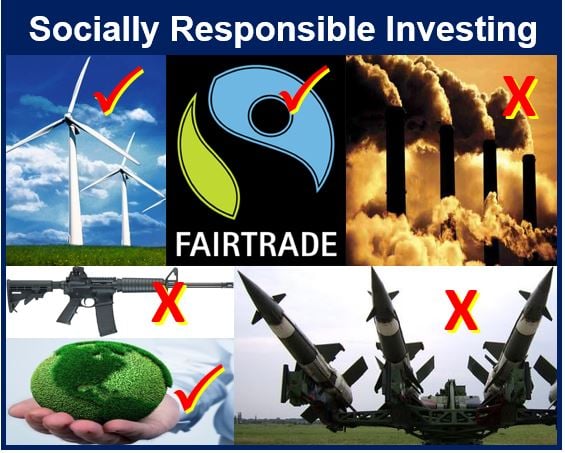Socially responsible investing means purchasing funds and assets just from companies that meet specific standards in terms of racial equality, fair pay, social welfare, public health or the environment. In some cases it might also include avoiding investments that come from countries with regimes the investor disapproves of.
Socially responsive investing is also known as SRI, ethical, green, socially conscious or sustainable investing. Some people use the term ‘responsible investment‘ with the same meaning.
A growing number of people worldwide are concerned about their country, the world, its environment and people. When they invest their money, they want more back than simply a monetary return on their investment. They would like to make a positive impact.
 SRI funds are growing and today represent several trillion dollars.
SRI funds are growing and today represent several trillion dollars.
Put simply, SRI seeks to consider both social good and financial return.
Socially responsible investing is said to encourage businesses to become more environmentally friendly, defenders of human rights, protectors of consumers, and promoters of diversity.
Some so-called socially responsible investors avoid companies involved in:
- the military,
- gambling,
- fossil fuel production,
- nuclear energy,
- weapons,
- animal experiments,
- abortion and/or contraception,
- alcohol, and
- tobacco.
The SRI industry is generally concerned about ESG (environment, social justice and corporate governance) issues.
Asset managers in charge of SRI portfolios screen companies before deciding whether to purchase their stocks on behalf of clients. Some people include shareholder advocacy and community investing as components of SRI.
Three main ways to screen companies
There are three main ways of screening a company for inclusion into an SRI fund – the Negative, Positive and Restricted Screen.
If a company is excluded because it is involved in a particular industry, such as tobacco, that is a Negative Screen.
If you include a company because it is involved in activities that promote things you like, such as solar or wind power, this is called a Positive Screen.
A Restricted Screen is when you decide to invest to a limited extent in a highly diversified company, but whose activities include some operations you don’t like. In other words, it is neither 100% blocked out, but your door is not completely open.
Socially responsible investing has been around for a long time
Western European socially responsible investing dates back to the eighteenth century with the Quakers (Religious Society of Friends). The Quaker Philadelphia Yearly Meeting in 1758 prohibited members from taking part in slave trade-buying or selling humans.
John Wesley (1703-1791), one of the founders of the Methodist Church, stated clearly in his sermon ‘The Use of Money’, that business practices should not harm your neighbor. He stated that socially responsible investing meant avoiding industries like chemical production and tanning, which were bad for workers’ health.
Socially responsible investing was initially motivated for religious reasons. Today, investors may also be driven by environmental, ethical and human rights concerns.
According to an article written by Michael Chamberlain in Forbes, about $1 of every $9 under professional management in the United States is an SRI investment. SRI investing grew by more than 22% to $3.74 trillion in total managed assets over a 2-year period ending in April 2013.
Video – How socially responsible investing can make business sense
In this video, Professor Alex Edmans, who works at the Wharton School of the University of Pennsylvania, explains how socially responsible investing can be a good business strategy.
